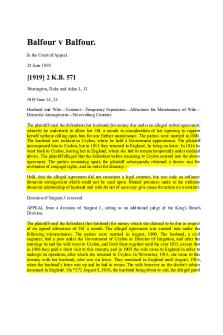Freeman v Buckhurst case study notes PDF

| Title | Freeman v Buckhurst case study notes |
|---|---|
| Author | Annmarie Rajapaksha |
| Course | Bachelor of Business |
| Institution | Swinburne University of Technology |
| Pages | 1 |
| File Size | 71 KB |
| File Type | |
| Total Downloads | 108 |
| Total Views | 162 |
Summary
Here are some helpful notes about an important case for LAW20019. This will be very helpful for the exam....
Description
Freeman and Lockyer v Buckhurst Park Properties (Mangal) Ltd [1964] 2 QB 480 FACTS Kapoor and Hoon formed a company for the purpose of developing a property. They each held half the issued shares and together with a nominee of each, comprised the board of directors. The quorum of the board was four, but at all material times, Hoon was overseas. Kapoor acted as managing director with the approval of the board, although he had not actually been appointed to that position. Kapoor engaged a firm of architects and surveyors on behalf of the company. The firm brought an action claiming payment for work carried out when the company refused to pay its fees.
ISSUE Who can hold out for the company by making representations of authority to outsiders on the company’s behalf so as to bind the company?
COURT RULING The court held that the company had held out that Kapoor was its managing director and was therefore bound by his actions. He had apparent authority to employ the architects because this was within the customary authority of a managing director. Because the outsiders had relied on the apparent authority of the managing director, they did not have to examine the company’s constitution or inquire whether the managing director had been properly appointed. Diplock LJ examined the law of agency as it applies to contracts with companies where the agent does not have actual authority. He concluded: If the foregoing analysis of the relevant law is correct, it can be summarised by stating four conditions which must be fulfilled to entitle a contractor to enforce against a company a contract entered into on behalf of the company by an agent who had no actual authority to do so. It must be shown: (a) that a representation that the agent had authority to enter on behalf of the company into a contract of the kind sought to be enforced was made to the contractor; (b) that such representation was made by a person or persons who had “actual” authority to manage the business of the company either generally or in respect of those matters to which the contract relates; (c) that he (the contractor) was induced by such representation to enter into the contract, that is, that he in fact relied on it. The representation that Kapoor had authority was made by the board, which had actual authority to manage the affairs of the company. This was so, even though the board had made no formal decision to that effect. The representation arose because the board failed to prevent him from acting as if he were the company’s managing director....
Similar Free PDFs

Freeman-Brown Case Study (Altig)
- 7 Pages

Payne v Cave Case Study
- 1 Pages

Balfour v Balfour - CASE STUDY
- 7 Pages

Walkovszky v. Carlton case study
- 8 Pages

R v Butcher case study
- 17 Pages

Mabo v Queensland - Case study
- 1 Pages

Harris v. Balk - Case Notes
- 2 Pages

Hanna v. Plumer - Case Notes
- 3 Pages

Jones v Padavatton - case notes
- 1 Pages

Hamilton v Nuroof - case notes
- 4 Pages

R V Hutty case notes
- 5 Pages

HESI Case Study Notes
- 20 Pages
Popular Institutions
- Tinajero National High School - Annex
- Politeknik Caltex Riau
- Yokohama City University
- SGT University
- University of Al-Qadisiyah
- Divine Word College of Vigan
- Techniek College Rotterdam
- Universidade de Santiago
- Universiti Teknologi MARA Cawangan Johor Kampus Pasir Gudang
- Poltekkes Kemenkes Yogyakarta
- Baguio City National High School
- Colegio san marcos
- preparatoria uno
- Centro de Bachillerato Tecnológico Industrial y de Servicios No. 107
- Dalian Maritime University
- Quang Trung Secondary School
- Colegio Tecnológico en Informática
- Corporación Regional de Educación Superior
- Grupo CEDVA
- Dar Al Uloom University
- Centro de Estudios Preuniversitarios de la Universidad Nacional de Ingeniería
- 上智大学
- Aakash International School, Nuna Majara
- San Felipe Neri Catholic School
- Kang Chiao International School - New Taipei City
- Misamis Occidental National High School
- Institución Educativa Escuela Normal Juan Ladrilleros
- Kolehiyo ng Pantukan
- Batanes State College
- Instituto Continental
- Sekolah Menengah Kejuruan Kesehatan Kaltara (Tarakan)
- Colegio de La Inmaculada Concepcion - Cebu


![Case Brief - Freeman & Locker v Buckhurst Park Properties [1964] 1 All ER 630](https://pdfedu.com/img/crop/172x258/k9255ngpp2mg.jpg)
